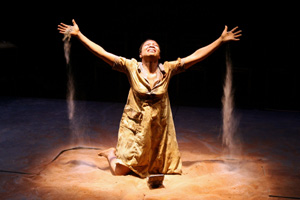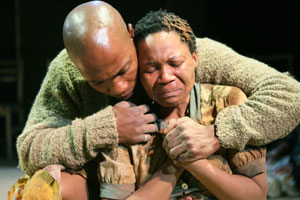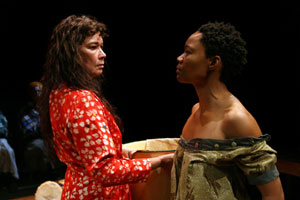June 13, 2007
Yael Farber cleverly adapts the Oresteia trilogy to tell the story behind the painful healing process experienced by the survivors of post-Apartheid South Africa, centring around the dynamics of the Truth and Reconciliation Commission. The structure of the Greek plays offers a satisfying context from which to see the evolution of a judicial system that replaces the understandable yearning for the ‘an eye for an eye’ style of revenge. The witnesses are the Greek Chorus, played exquisitely by The Ngqoko Cultural Group, from the town of Lady Frere, who exert a presence from the moment the audience enters the space. These blanket-wearing beat-dancing elders perform indigenous South African Music with string and mouth bows in the tradition of the Xhosa communities. The bird's eye view from the raked on-stage seating in the round is engulfing as the action switches from blood-strewn entrails, made by violent actions, to the formal Commission meeting hall where a case is being staged in such a way that the audience feels like witnesses. A black South African daughter (Elektra) is reporting mistreatment such as strangulation, cigarette burns and drowning, which the audience witnesses, at the hands of her white South African mother (Klytemnestra). ‘You have made a child of me through fear’ accuses Elektra, scintillatingly played by Jabulile Tshabalala, of her hard-bitten chain-smoking drunken mum, Klytemnestra, a role performed with vigorous energy by Dorothy Ann Gould. Whilst a metaphor for Apartheid is established in this relationship, Farber’s direction ensures it is always a real family that is portrayed with genuine dysfunctions, for example the mother is plagued by the fact she loves her son, the exiled Orestes, much more than her daughter.
It is reassuring that Farber still sees victim and perpetrator as a family unit and both are in agreement that neither group wants a ‘history without a future’ but one problem remains, as Elektra puts it ‘how can we move on until the debt is paid?’ Many insights are offered as to how the perpetrators feel, as Klytemnestra reveals ‘we are still only here by grace alone’. Justifying her actions she confronts Elektra with the wrongdoings of Agamemnon, the husband Klytemnestra murdered. Elektra interprets the offering of her sister Iphigenia’s life at the hands of Agamemnon as the ‘price of war’. Civil war scars one and all as Klytemnestra’s mental state deteriorates and she waits for the consequences of her actions to literally knock on the door. Heralded by the reverberation of a big drum a stranger offers her the ashes of her son, Orestes. So clearly told, ‘Molora’ (or ‘Ash’) offers a great introduction to the Oresteia and a climactic ending approaches. As the cycle of revenge becomes overwhelming, can the strong axe-wielding Orestes (Sandile Matsheni) be moved to kill his own mother or can the very painful process of healing begin? The action is subdued only by the soft fall of ash from above. This visual effect is inescapably similar to the fine powder that fell for days in Downtown Manhattan after the bombings of September 11th . In this moment the company offers us the possibility of something beautiful occurring that is unconscious of the cruelty that has created it. Those warm hearts of The Ngqoko Cultural Group send us home with a song, reminding us that in South Africa, as well as in Greek tragedy, strong beliefs exist to break down any revenge cycle. In a show that gets standing ovations in South Africa and now Oxford there has to be a universal truth, and for me it is if we stop picking our scabs long enough then eventually they will heal. Watch this house rise again and the Farber Foundry at work!
It is reassuring that Farber still sees victim and perpetrator as a family unit and both are in agreement that neither group wants a ‘history without a future’ but one problem remains, as Elektra puts it ‘how can we move on until the debt is paid?’ Many insights are offered as to how the perpetrators feel, as Klytemnestra reveals ‘we are still only here by grace alone’. Justifying her actions she confronts Elektra with the wrongdoings of Agamemnon, the husband Klytemnestra murdered. Elektra interprets the offering of her sister Iphigenia’s life at the hands of Agamemnon as the ‘price of war’. Civil war scars one and all as Klytemnestra’s mental state deteriorates and she waits for the consequences of her actions to literally knock on the door. Heralded by the reverberation of a big drum a stranger offers her the ashes of her son, Orestes. So clearly told, ‘Molora’ (or ‘Ash’) offers a great introduction to the Oresteia and a climactic ending approaches. As the cycle of revenge becomes overwhelming, can the strong axe-wielding Orestes (Sandile Matsheni) be moved to kill his own mother or can the very painful process of healing begin? The action is subdued only by the soft fall of ash from above. This visual effect is inescapably similar to the fine powder that fell for days in Downtown Manhattan after the bombings of September 11th . In this moment the company offers us the possibility of something beautiful occurring that is unconscious of the cruelty that has created it. Those warm hearts of The Ngqoko Cultural Group send us home with a song, reminding us that in South Africa, as well as in Greek tragedy, strong beliefs exist to break down any revenge cycle. In a show that gets standing ovations in South Africa and now Oxford there has to be a universal truth, and for me it is if we stop picking our scabs long enough then eventually they will heal. Watch this house rise again and the Farber Foundry at work!






